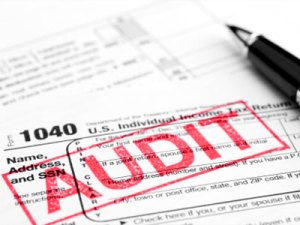5 Tips for Avoiding an IRS Tax Audit

IRS audits are feared for good reason: at best, they’re disruptive, and at worst they can cost you vast amounts of money. Though the percentage of audited returns is relatively low, every year the IRS still audits a huge number of returns. Following these tips can help you reduce the chances you’ll end up as one of their targets.
Be Diligent With Business Deductions
This primarily pertains to the self-employed and business owners. While it may be tempting to write off your apartment as a home office or your car as a business investment, the IRS has careful formulas for determining whether or not particular expenses are deductible. For instance, only the part of your home used exclusively counts towards the home-office deduction—meaning writing off too much square footage could get you noticed. Car expenses, likewise, must be carefully calculated. If you’re thinking of writing something off, you should do some research or contact a tax professional.
Keep Everything
No, not “everything” as in money. “Everything” here means documentation, like receipts, pay stubs, leasing agreements—really, anything that might be slightly relevant during tax time. Tax returns gets much more difficult to complete when you’re missing documents–and complications could lead to you miscalculating a deduction or forgetting to declare an income source. And, in the unfortunate event of an audit, you will need all of your documentation to verify your deductions.
Choose Your Professional Wisely
Many people, especially those with complicated tax situations, hire tax professionals to help take the headache out of tax season. But according to MSN Money, choosing the wrong tax “pro” can be disastrous. So, when picking a tax preparer, check out their track record, customer reviews, how long they’ve been in business, their Better Business Bureau standing—just do your homework, as you would when hiring any other type of professional. R&G Brenner currently has an A+ Rating with the BBB
Pay Quarterly Taxes (If Necessary)
If you’re self-employed, the IRS expects you to keep up with your tax obligations throughout the year. This means not only filing an annual return, but also paying quarterly taxes if a certain proportion of your income comes from self-employment. It’s especially vital for the self-employed to keep up with their taxes because they have no employer withholding income taxes or chipping in on Medicare and Social Security taxes. Some tools you can use to keep up with your quarterly taxes are Form 1040-ES, which can help you determine if you need to pay quarterly taxes, and the Electronic Federal Tax Payment System, which you can then use to pay quarterly taxes.
Electronically File
Depending on the system you use, electronic filing (e-filing) can have several advantages: less paperwork cluttering your desk, easy deduction-tracking systems, built-in calculators, and so on. But perhaps the biggest advantage is that, according to the IRS, e-filed returns have an error rate of only 1%, compared to 20% for paper returns. And if there is an error, e-filed returns can report back to the sender much more quickly, hopefully allowing them to correct the problem. Furthermore, the IRS & states like NY require all tax returns to be e-filed unless you have a legitimate excuse for not filing electronically. If they don’t like your excuse, they can fine you.
These tips are general, but every taxpayer’s situtation is unique. For more help, the IRS website—while sometimes complex—has resources for just about all tax situations. You can also talk to an R&G Brenner qualified tax professional to help you navigate the nuances of the tax code.





